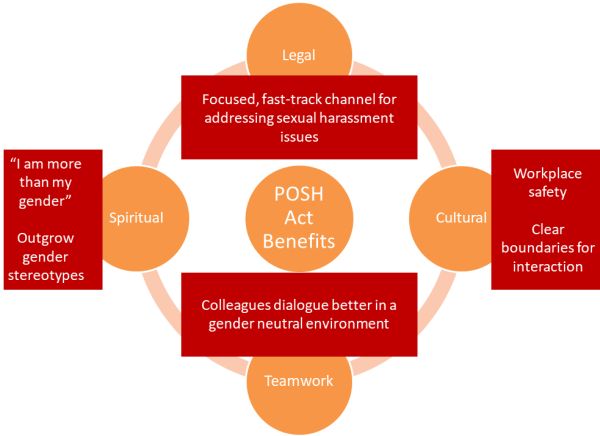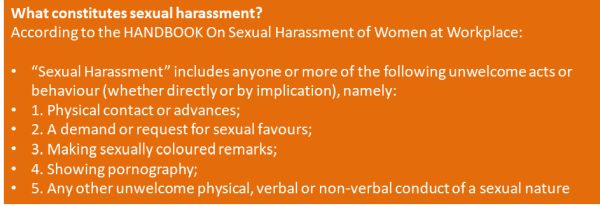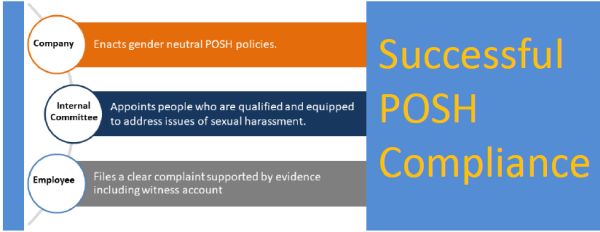How the POSH ACT can create an evolved, inclusive work culture.
Introduction
Gender is just one aspect of an individual's identity. Yet, we divide our world, our home, even our workplace —sometimes subtly, sometimes ruthlessly —along gender lines. We forget that our personalities are the driving force behind our behaviours and attitude.
We are not just our gender, we are so much more.
But our unconscious bias keeps us rooted in SOGI-based bullying from childhood. It then becomes imperative to introduce legislation that helps us cope in suspected gender wars, especially when it takes the form of sexual harassment in the workplace.
The POSH Act
Long awaited and well deserved —the Sexual Harassment of Women at Workplace (Prevention, Prohibition and Redressal) Act of 2013, known as the POSH Act—is one such starting point.

From a legal perspective, the Act can help companies create a focused, fast-track channel for addressing issues of sexual harassment.
From an office culture perspective, it can create a sense of safety and set clear boundaries for interaction.
From a teamwork perspective, the Act can help colleagues dialogue better with each other in a gender neutral environment.
From a spiritual perspective, it can help people realize that "I am more than my gender" and outgrow gender stereotypes.
Our Stance
While we admire many aspects of the POSH Act, at Marat Gogia, we would like to see the Act further evolve to cover all instances of sexual discrimination and harassment in the workplace —regardless of the gender of the victim.
- Change 'aggrieved woman' to 'aggrieved person '.
-
- Perhaps, even include transgender people under its purview.
- Make molestation and sexual assault cognizable under POSH.
However, before we can take that next step, we must take a more urgent step —the one of helping companies across India implement this Act in its current avatar in the best interest of their employees and work culture. So, how can we help you implement POSH—from a legal and cultural standpoint?

Working with POSH
The Sexual Harassment of Women at Workplace (Prevention, Prohibition and Redressal) Act addresses instances of direct or implied sexual verbiage or sexual misconduct in the workplace.
Any workplace with 10+ employees needs to implement the Act.
- This includes public and private sector (domestic and multinational entities.
- The Act protects all women (employees, clients, and visitors)—whether in the indoor or outdoor work spaces (permanent, temporary, or transit}.
Employer's Obligations
Employer is required to:
- Continuously educate and sensitize employees on sexual harassment as described in POSH.
- Constitute an Internal Complaints Committee (IC) at each office or branch with 10+ employees.
- Implement the IC's recommendations within 60 days.
- Publically disclose the IC's annual report in the company's annual report.
Internal Complaints Committee
- Head of the IC must be a senior female officer in the company.
-
- Half the members must be women.
- One member must be from an NGO that works with women-centric causes.
- IC must first attempt to reconcile between both employees.
-
- Reach a non-monetary settlement between the aggrieved woman and respondent.
- If that fails, the IC can initiate a confidential inquiry if requested by the victim.
-
- Gather evidence (like a civil court).
- Complete the inquiry within 90 days.
- Report to the company and district labour court/office.
The Aggrieved Woman
The aggrieved woman, her legal heir, or appointed person can:
- Make a written complaint to the IC within 3 months of the incident.
- Submit 6 copies of this complaint with details of the accused and witnesses.
- Use the SHe-Box forum to register her complaint outside the organization.
- Attach any/all evidence: emails, screenshots of texts or messages, call details or recordings, photographs, etc.
- Request the IC to initiate an enquiry.
- Request a transfer or paid leave while the enquiry is on-going.

Conclusion
At Marat Gogia, we have developed one such model.
- We not only help align employees and managers across departments with their legal rights under the Act, we also help the IC proactively take measures to cope with gender-based attitudes in the workplace.
- Additionally, we mentor and coach teams through role-plays, videos, and brainstorming sessions to define their own version of a gender neutral workplace.
Your Next Step
According to KelpHR, 23% of organizations are not fully compliant with the POSH Act. You can change that. Help us help you implement the POSH Act successfully.
The content of this article is intended to provide a general guide to the subject matter. Specialist advice should be sought about your specific circumstances.
